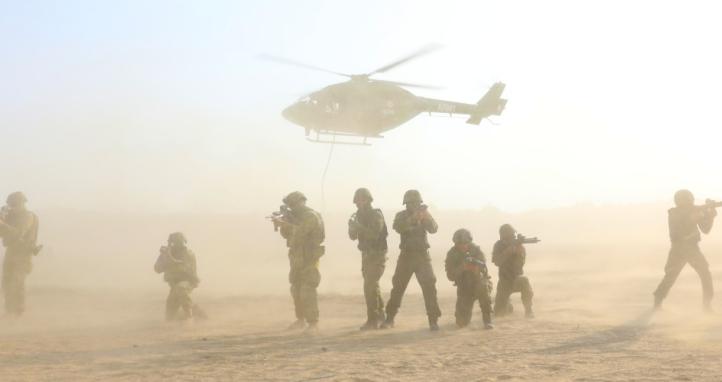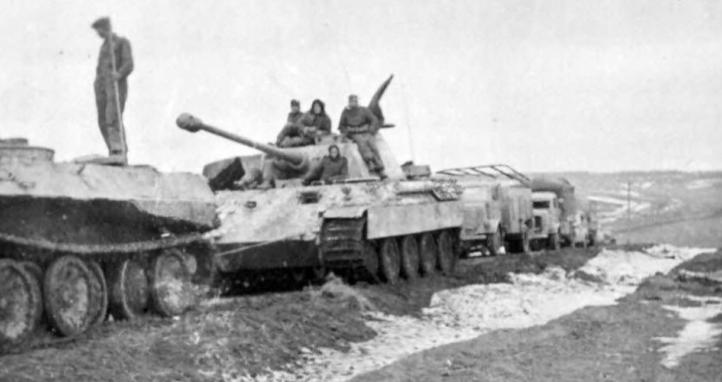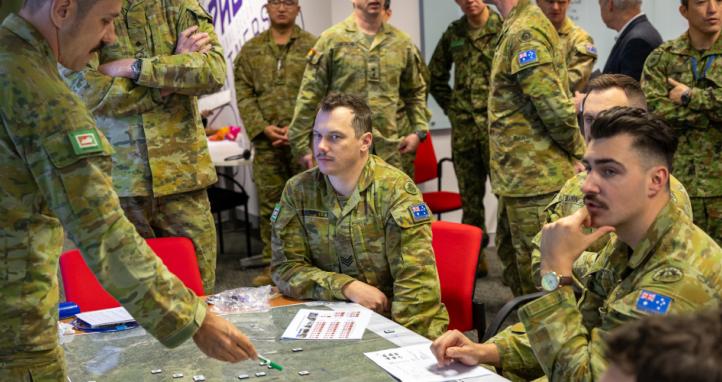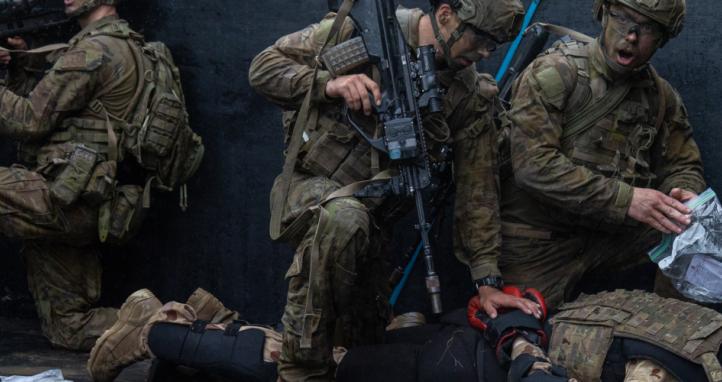Facts and figures
The ‘Know Your Region’ series is designed to support unit and individual professional military education on the South East Asian region. It’s important for all serving members of our military to have a foundational knowledge of the countries and issues in the Indo-Pacific.
THAILAND – SPECIAL ISSUES
On this page:
- King Vajiralongkorn
- Thai Protests
King Vajiralongkorn
The King of Thailand is the head of state and head of the ruling Royal House of Chakri. Although the current Chakri Dynasty was created in 1782, the existence of the institution of monarchy in Thailand is traditionally considered to have its roots from the founding of the Sukothai Kingdom in 1238. The institution was transformed into a constitutional monarchy on 24 June 1932 after the bloodless Siamese Revolution. The coup d'état was launched by the first political party in Siam, the Kana Ratsadon (People's Party), alongside a small group of civilians and the military in response to domestic issues as well as global political currents. This brought down almost 800 years of absolute monarchy under the Kings of Siam and introduced democracy, the first constitution of Thailand, and the creation of the National Assembly of Thailand. It also marks the beginning of the civilian-military rivalry for control of the Government of Thailand that has caused political instability in the modern Kingdom. For more information about the revolution and the monarchy’s new place in Thai power structures watch the video below.
The monarchy's official ceremonial residence is the Grand Palace in Bangkok, while the private residence has been at the Dusit Palace. Vajiralongkorn is the King of Thailand. He is the only son of King Bhumibol Adulyadej and Queen Sirikit and was made Crown Prince at the age of 20 in 1972. After his father's death on 13 October 2016, he was expected to ascend to the throne of Thailand but asked for time to mourn before taking the throne. He accepted the throne on the night of 01 December 2016. His coronation took place in May 2019 and the Thai Government retroactively declared his reign to have begun on 13 October 2016, upon his father's death. As the tenth monarch of the ancient Chakri dynasty, he is also styled as Rama X. Aged 64 at that time, Vajiralongkorn became the oldest Thai monarch to ascend to the throne.
Australia has a long association with the Thai Royal Family. His Majesty the late King Bhumibol Adulyadej and Queen Sirikit visited Australia in 1962. Then-Thai Crown Prince and current King, His Majesty King Maha Vajiralongkorn, studied at secondary school and The Royal Military College of Australia, subsequently completing training with the Australian Army's Special Air Service Regiment in Perth. After completing his studies, Vajiralongkorn served as a career officer in the Royal Thai Army. He is a qualified fixed-wing and helicopter pilot, and can fly the Northrop F-5, F-6, and the Boeing 737-400. To learn more about the relationship between the reigning monarch and Australia, watch the next video.
Vajiralongkorn's reign has been plagued by controversies. His image compared to his predecessors is affected by his luxurious lifestyle and reputation as a playboy. He is the wealthiest monarch in the world, with a net worth estimated to be between US$30 billion and US$70 billion. This wealth was boosted in 2018 when he was granted personal ownership of royal assets (previously considered public assets) from the Crown Property Bureau, valued at approximately US$40 billion.
Showing disrespect for the King and the royal family is not only a social taboo but illegal in Thailand. Under the lèse majestè laws, a French term meaning 'to do wrong to majesty', it is illegal to defame, insult, or threaten the King, Queen, heir-apparent, heir-presumptive, or regent. The law has criminalised acts of insult since 1957 in the Section 112 of the Thai Criminal Code, but there is substantial room for interpretation which contributes to the controversy. Thailand is the only constitutional monarchy to have strengthened its lèse majestè law since World War 2. With penalties ranging from 3-15 years imprisonment for each count, it has been described as the world's harshest lèse majestè law and is possibly the strictest criminal-defamation law anywhere. Thus, citizens are restricted from exhibiting behaviour that could be interpreted as defamatory or critical of the royal family.
For more information on King Vajiralongkorn and the monarchy’s contemporary position, access the following resources.
- Articles
- ABC News | The Australian government made a documentary about Thailand's King. But the timing has raised some eyebrows
- Vox | Thailand's playboy king isn't playing around
- Reuters | Thai monarchy budget survives rare calls for cuts in parliament
- World Politics Review | Why Thailand's Protesters Are Up in Arms Against the Monarchy
- Thai Enquirer | Understanding the formation of the Crown Property Bureau and why it matters to protesters
- Scoop | Thailand: UN Experts Alarmed By Rise in Use of lèse-majesté Laws
- Videos
- Podcasts
- Matter File | Episode 11: Thailand and the Development of Monarchy
- Forgotten History of Pacific Asia War | Episode 47: The Repositioning of Power - Thai Monarchy Pre and Post WWII
- Dressed: The History of Fashion | Queen Sirikit of Thailand, an Interview with Melissa Leventon
- New Books in Southeast Asian Studies | Patrick Jory, “Thailand’s Theory of Monarchy: The Vessantara Jataka and the Idea of the Perfect Man” (SUNY Press, 2016)
Thai Protests
According to this Reuter’s article, Thailand has a long history of coups, kings, and protests. However, the past two-years of pro-democracy protests have unique characteristics and have broken one of the country's sacred taboo: criticism of the monarchy. The protesters are mostly students and young people, without centralised leadership, and have publicly critiqued the monarchy's role and powers, despite the above-mentioned strict lèse-majesté laws.
The latest round began in early 2020 with demonstrations against the administration of Prime Minister Prayut Chan-o-cha. Initially triggered by the dissolution of the Future Forward Party (FFP) in late February 2020, but also from lingering discontent concerning changes to the Thai Constitution in 2017 and the country's future political landscape. The second wave from July to December 2020 expanded to include unprecedented demands for reform of the Thai monarchy. The next wave was shorter and consisted of smaller and sporadic protests as the lèse-majesté law was used to target core leaders. This game of cat and mouse went from February to March 2021. The latest wave started in June 2021 with rallies in more than 30 provinces held on 01 August 2021. It focuses on the Government's mishandling of the pandemic, calls to repeal the junta constitution, reboot the economy, and royal reform. To learn more about the reasons behind the protest, watch the following ABC News report.
[Warning: graphic content]
Criticism of the monarchy was quite rare during the 70-year reign of King Bhumibol Adulyadej, which ended with his death in 2016. The former King restored respect to the throne and helped define the modern Thai political landscape with minimal interference. Since assuming the throne, King Vajiralongkorn has been vocal in Thai political affairs, making royal announcements in favour of specific parties, and doubling the royal budget in two years. It is important to clarify that most protesters are not in favour of the dissolution of the monarchy. Instead, the aim is for reform to re-align the monarchy in reflection of modern Thai society in a democratic and constitutional political system, while removing laws that shield the royal family from criticism.
Three demands have been consistent throughout the protest waves and were presented to the Thai Government: the resignation of Prime Minister Prayut and dissolution of parliament, ending Government intimidation of the people, and the drafting of a new constitution. The latter is a major source of discontent since the military-drafted constitution in 2017 binds all future Governments to a two decade 'road map' of military-guided democracy. Further sources of grievance include abortion rights, authoritarianism in the Thai education system (specifically hazing practices), labour rights, military reform including the ending of conscription and reducing the budget, market monopolies, and women's rights.
In recent years, critics of Thailand's monarchy who have fled to neighbouring countries have been abducted and murdered. The response of the Thai Government to the last two years of protests has ranged from: filing criminal charges using the Emergency Decree, arbitrary detention and police intimidation, delaying tactics, the deployment of military information warfare units, media censorship, the mobilisation of pro-government and royalist groups. Since the return of King Vajiralongkorn from Germany, the authorities have decreased their tolerance for demonstrations. A recent trend has seen Thai authorities move away from the lèse-majesté law and use other legal routes to target dissent, including the sedition law. To hear from protestors on both sides, watch VICE Asia’s report below.
[Warning: graphic content]
The youth protests are seen as being more creative, networked, and technologically savvy than the Government. One Bangkok Post columnist wrote that republican sentiment has never been stronger in Thailand, while others argue the protesters need to broaden their agenda to wider societal reforms.
The protest movement's utilisation of coordinated protest techniques, including the use of communications technology, memes, music, and social media has contrasted with the traditional techniques used by law enforcement, such as police battalions, state propaganda, and water cannons. Thai police have been consistently cracking down on the student-led movement. After the police crackdown on 16 October 2020, the hashtag #WhatsHappeningInThailand was created and heavily utilised, with content published in various languages across various social media platforms to attract global attention to the situation in the country. In some rallies, most of the participants were women, including schoolgirls protesting for social change and against gender inequality and Thai patriarchal structures.
Unique attempts of getting around the lèse-majesté law include pop culture references such as the Hunger Games three-finger salute or holding placards that read, 'if we burn, you burn with us' to represent liberty, equality, and brotherhood; as well as Harry Potter themed protests to reference the inability to name their opponent. Two other acts of expressing anti-coup stance have already been criminalised: reading George Orwell's Nineteen Eighty-Four in public and wearing shirts with certain slogans such as 'Peace Please' and 'Respect My Vote'. Another outcome of the protests is a growing sense of regional solidarity seen in the virtual formation of the Milk Tea Alliance and comradery with Myanmar protesters. For more information on how this alliance came about and its broader impact, watch the following video.
- Articles
- The Diplomat | ‘In Milk Tea We Trust’: How a Thai-Chinese Meme War Led to a New (Online) Pan-Asia Alliance
- Prachatai | Student movement organizes Car Mob demanding political and monarchy reform
- ABC News | Thai protestors launch projectiles and homemade bombs at police as discontent over the pandemic boils over
- Financial Times | Thai protesters make history but fail to bend government to demands
- The New York Times | Woman Is Sentenced to 43 Years for Criticizing Thai Monarchy
- Videos
- BBC News | Thailand’s youth rebellion and the monarchy [Warning: graphic content warning]
- Thisrupt | History: Black May 1992
- Al Jazeera English | Justice for Thailand's Disappeared - 101 East
- CNA Insider - Insight | Behind The Return Of Thailand’s Student Protests
- South China Morning Post | How demonstrators in Thailand marshall anti-government protests with hand signs
- Podcasts
Discussion Questions:
- Thailand has seen numerous military coups over the past few decades yet appears to maintain some sense of economic stability. What does this broader stability mean for the region and Australia’s role within it?
- The Thai monarchy was once seen as revered universally among the populace, largely due to the fine balance between conducting public duties and having limited political interference by the late King Bhumibol. What does this culturally significant relationship of King to people mean for Army personnel operating with Thai military?
- Frequent protests in Bangkok, often against the government, are managed in different ways, ranging from conceding to protester demands, to violent suppression. Are protests just part of the Thai political landscape, or are there underlying issues that will grow to impact Army’s ability to operate with the Thai military?
Know your region
Know Your Region series gives you a shortcut to understanding other nations in the Indo-Pacific region.









